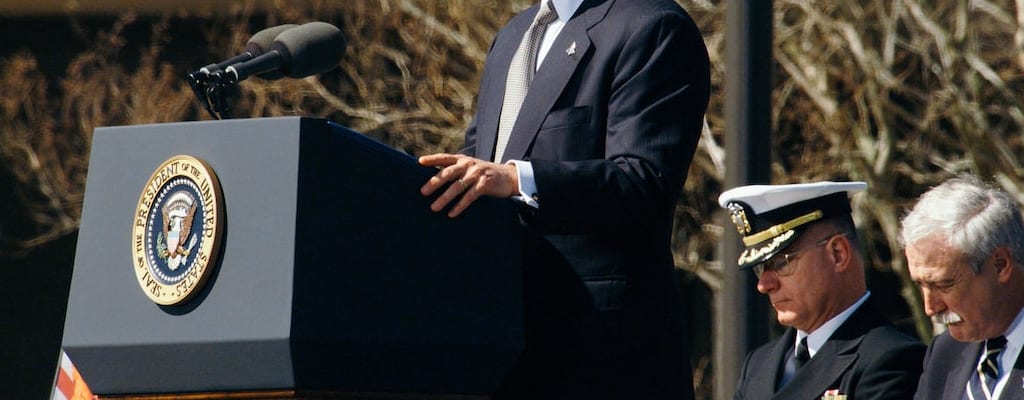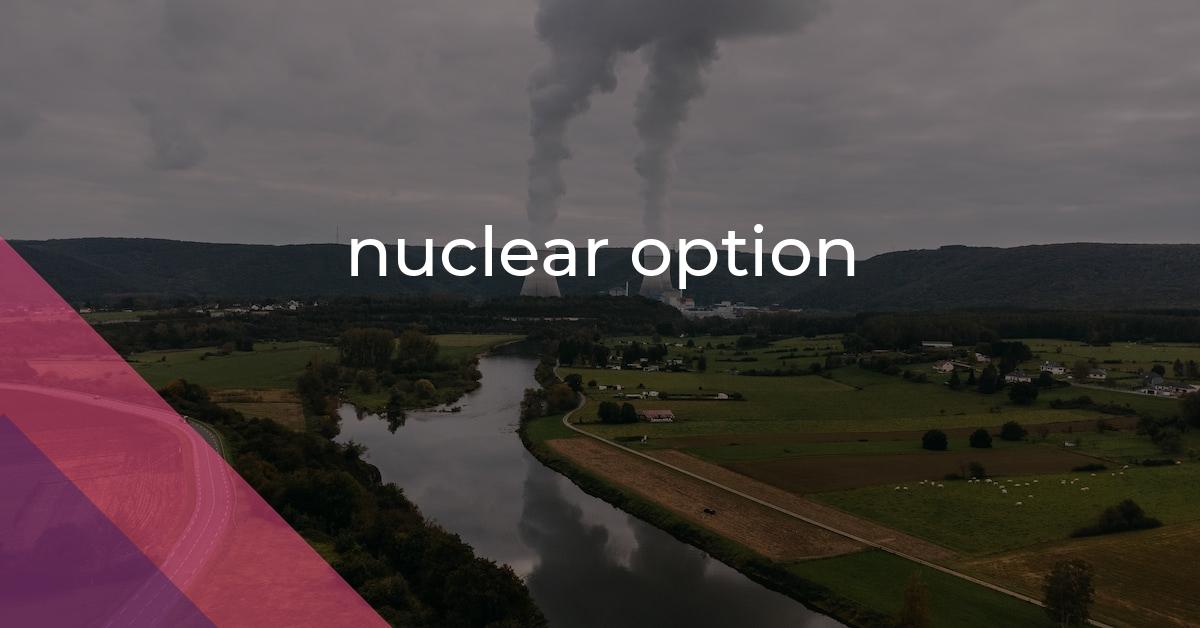nuclear option: Idiom Meaning and Origin
What does ‘nuclear option’ mean?
The idiom "nuclear option" refers to a drastic or extreme course of action that is intended to have a significant and often irreversible impact on a particular situation or issue.

Idiom Explorer
An idiom used to emphasize the extreme or exceptional quality of someone or something.
*or else* is an idiom used to convey a consequence or alternative outcome that will occur if a specific action is not taken or a condition is not met.
The idiom "only game in town" means that there's only one option or choice available, typically in a particular situation or context.
The idiom "once and for all" means to do something finally or decisively, resolving a situation or completing a task definitively.
The idiom "off the table" means that a possibility or option has been eliminated or is no longer being considered.
The idiom "of choice" is used to describe something that is the preferred or favored option among a range of possibilities.
The idiom "nut-cutting time" refers to the critical moment when decisive action needs to be taken in order to achieve a desired outcome.
The idiom "now or never" means that something must be done immediately or it will never be possible to do it. It emphasizes the urgency of taking action without delay.
The idiom "no ways" is used to express strong disbelief or refusal towards something. It indicates a firm stance or disagreement and is often used as a response to a suggestion or proposal.
The idiom "no way" is used to show strong disbelief or refusal towards something. It expresses a complete lack of possibility or chance for something to occur or be true.
Harnessing Extreme Authority
The idiom "nuclear option" is deeply rooted in American politics. It refers to a drastic action taken by a legislative body, particularly the United States Senate, to change its rules and procedures. This term has gained significant prominence in recent years, especially in controversies surrounding judicial nominations and the confirmation process. The use of the term "nuclear" emphasizes the extreme nature of the action, likening it to the potentially devastating effects of a nuclear explosion.
The exact origins of the idiom "nuclear option" are difficult to pinpoint. However, it is believed to have emerged in the early 2000s. The idiom draws inspiration from the phrase "nuclear warheads," highlighting the notion of immense power and irreversible consequences. Originally used in the realm of military and foreign policy, the term was adopted and adapted by political pundits and commentators to describe a similarly intense strategy within the legislative arena.
The nuclear option involves breaking long-standing Senate rules, such as the filibuster, to bypass opposition and achieve a specific policy outcome. The filibuster is a procedural tactic that allows senators to delay or block a vote on a bill or nomination by speaking for an extended period. By deploying the nuclear option, the majority party in the Senate can effectively eliminate the filibuster and proceed to a vote with a simple majority, rather than the usual 60-vote threshold.
The nuclear option is not without consequences. While it can provide short-term victories for the majority party, it has the potential to erode trust and further polarize an already divided political landscape. Its use raises questions about the long-term implications for the functioning of the Senate and the democratic process as a whole. Whether it leads to genuine reform or sets a troubling precedent remains a matter of ongoing debate.
In the realm of idiomatic expressions, the term "nuclear option" serves as a vivid metaphor for the extreme and potentially destructive actions taken in the pursuit of political goals. Its evocative power lies in the association with the grave implications of nuclear warfare. Thus, when employed in discussions or analysis, the idiom encapsulates the gravity and irreversible nature of certain decisions made within the political arena.
One related idiom that can be associated with the nuclear option is "last resort." Just as the nuclear option represents a drastic and extreme action in politics, the concept of a last resort refers to a final course of action when all other options have been exhausted. When faced with seemingly insurmountable challenges or obstacles, individuals or groups may ultimately resort to the nuclear option or a last resort in order to achieve their desired outcome.
The nuclear option can also be likened to the idiomatic phrase "choose violence." While violence in the context of this idiom does not necessarily refer to physical aggression, it signifies a willingness to employ extreme measures or intense tactics to achieve a particular objective. In politics, the nuclear option can be seen as a manifestation of this idiom, as it involves using a drastic action to bypass opposition and push through desired policy changes.
Additionally, the idiom "nothing for it" can be linked to the nuclear option. When confronted with a difficult situation or seemingly impossible decision, individuals may feel that there is "nothing for it" but to take drastic action. Similarly, in the political sphere, the nuclear option can be viewed as a response to an impasse or deadlock where alternative avenues for achieving policy goals have been exhausted.
Another idiom that relates to the nuclear option is "last-ditch." Just as the nuclear option represents a final and extreme maneuver in politics, a last-ditch effort refers to a final attempt or desperate action to achieve a desired outcome. When all other options have been exhausted, individuals or groups may resort to the nuclear option or a last-ditch effort as a final gamble in pursuit of their goals.
The nuclear option can also be described as a "now or never" action. When faced with a critical or time-sensitive situation, individuals may feel compelled to take immediate and decisive action. In the political realm, the nuclear option exemplifies this idiom, as it involves seizing a limited opportunity to bypass opposition and accomplish a specific policy outcome.
The idiom "nuclear option" refers to a drastic action taken by a legislative body to change its rules and procedures. This idiom has its origins in American politics and is often associated with controversies surrounding judicial nominations and the confirmation process. The nuclear option involves breaking long-standing Senate rules, such as the filibuster, to achieve a specific policy outcome. While it can provide short-term victories for the majority party, its use raises questions about the long-term implications for the functioning of the Senate and the democratic process. When used in discussions or analysis, the idiom "nuclear option" serves as a metaphor for the extreme and potentially destructive actions taken in the pursuit of political goals. It can be related to idioms such as "last resort," "choose violence," "nothing for it," "last-ditch," and "now or never," which all convey the concept of extreme actions taken when all other options have been exhausted.
Example usage
Examples of how the idiom "nuclear option" can be used in a sentence:
- After failed negotiations, the union members decided to exercise the nuclear option and go on an indefinite strike.
- The team was not performing well, so the coach decided to use the nuclear option and replace several players in the starting lineup.
- In an attempt to pass the bill, the senator threatened to use the nuclear option and change the Senate's rules to allow a simple majority vote.
More "Politics" idioms



